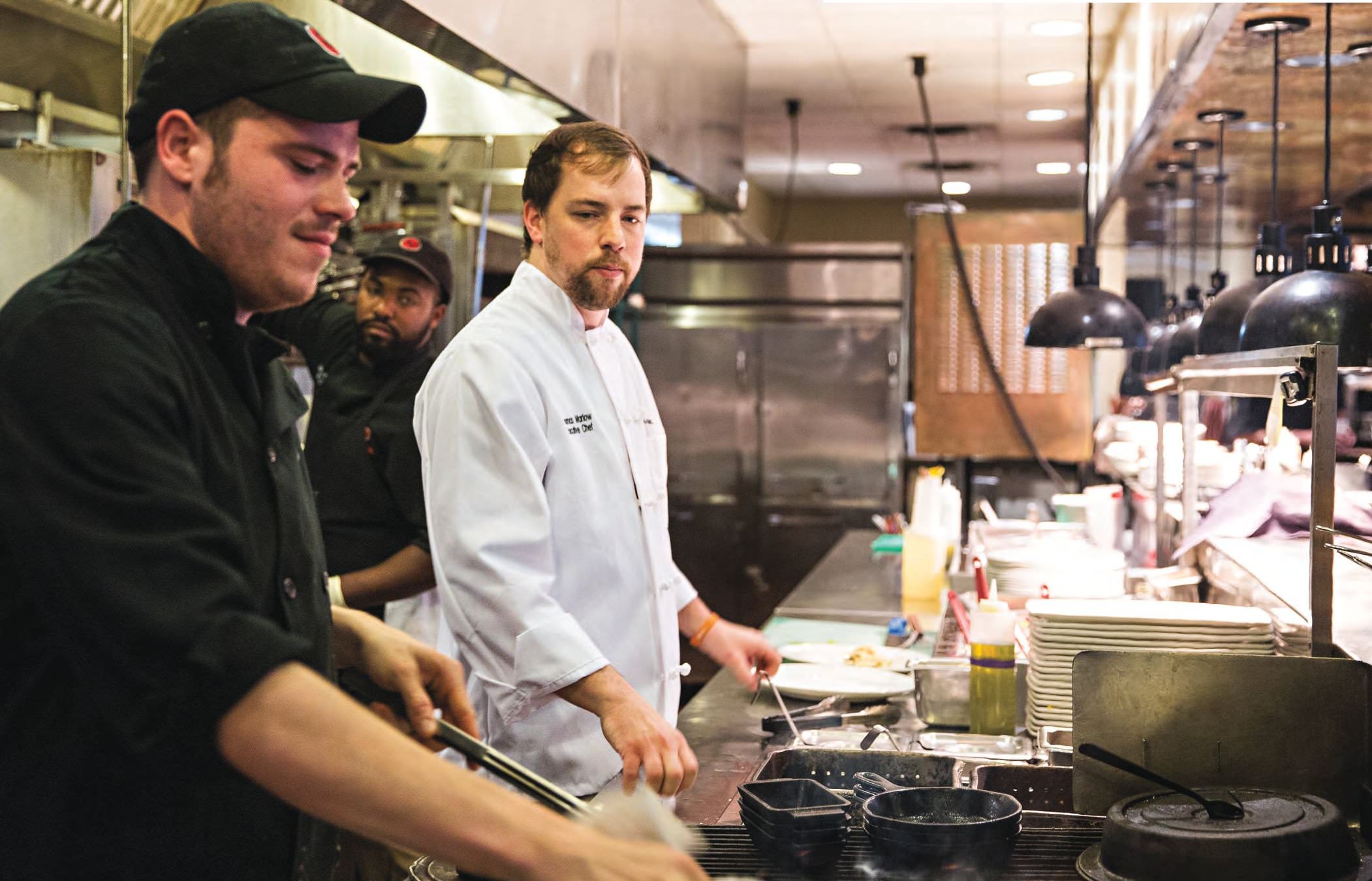There are four culinary schools in Charlotte. So why is there a shortage of cooks in the city’s restaurants?

A SWINGING DOOR FLIES OPEN toward the 300 East dining room momentarily, long enough for me to glimpse a tall guy in a skull cap reach for something on a high shelf. He is young, and he is sweating.
I learn later that he is a prep cook named Michael Murphy, one of thousands in our city’s restaurants who are not chefs in the strictest sense, in that they are not in charge of the kitchen. But they’re still cooks. They tend to kitchen pantries, unpack and sort deliveries, work the sauté station, and man the grill. They break down meats, clean up at the end of shift, and chop vegetables, over and over.
They rarely (if ever) make the covers of magazines, or even the pages inside. Outside of accidental glimpses such as this one or at a few restaurants with open kitchens, we never see them. Our ability to enjoy a good meal outside of the home, however, relies upon them showing up to work.
Have a pint or two after hours with a chef, and he or she might get to telling you about time “on the line.” The line is the place in the kitchen where the cooking gets done, and is often the place for winnowing out the less serious cooks. The pace is fast, the heat is intense, and the demands are unrelenting. The chef’s story will surely have the weary but proud timbre of a soldier’s tale.
Lately, chefs in Charlotte have had trouble staffing their lines. You might assume that a city with four culinary schools could supply enough resources for the city’s restaurant scene. But here and in many other cities across the country, the pace of restaurant openings is outpacing the number of cooks available—reliable ones such as Murphy, who has been at 300 East for two years, a relatively long time for that position.
Denne historien er fra January 2017-utgaven av Charlotte Magazine.
Start din 7-dagers gratis prøveperiode på Magzter GOLD for å få tilgang til tusenvis av utvalgte premiumhistorier og 9000+ magasiner og aviser.
Allerede abonnent ? Logg på
Denne historien er fra January 2017-utgaven av Charlotte Magazine.
Start din 7-dagers gratis prøveperiode på Magzter GOLD for å få tilgang til tusenvis av utvalgte premiumhistorier og 9000+ magasiner og aviser.
Allerede abonnent? Logg på

‘This Is How We're Going to Make Your Child Better'
Pediatric neurosurgery is technically and emotionally complex—and traditionally dominated by men. As Novant’s first female pediatric neurosurgeon, Dr. Erin Kiehna Richardson has had to learn the intricacies of a demanding field and battle sexism along the way

The Dumbledore of CMC
A surgery resident wrote a series of children’s books and created a special kind of medical magic

LGBTQ HB2+5
Five years after the furor of House Bill 2, the LGBTQ community—in Charlotte, in North Carolina, and across much of the nation—fights attacks on new fronts

Oh, Snap!
New ‘selfie museum’ in Concord celebrates the 1990s

ALLISON LATOS
The WSOC anchor on her hard trek from one episode of loss and grief to another—and the meaning of resilience

GOOD HEALTH
For years, Charlotte has been one of the largest American cities that lacked a four-year medical school. The health care professionals who finally made it happen overcame a series of setbacks, false starts, and failures, and they plan to use their clean slate to create a new kind of community asset

Summer Partee
From woodwork to retail, the kindergarten teacher-turned-designer has learned how to do it herself

Uptown or Downtown?
Archives illuminate how long we’ve argued over the perennial question

NOW OPEN NOVEL ITALIAN
Paul Verica brings a simpler version of the city’s hottest food trend to NoDa

TOP DOCTORS 2021
The annual list you can't without